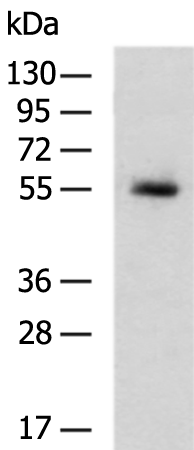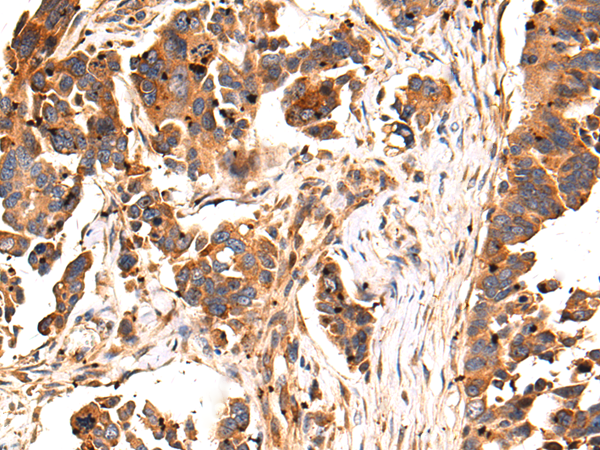

| WB | 咨询技术 | Human,Mouse,Rat |
| IF | 咨询技术 | Human,Mouse,Rat |
| IHC | 1/100-1/300 | Human,Mouse,Rat |
| ICC | 技术咨询 | Human,Mouse,Rat |
| FCM | 咨询技术 | Human,Mouse,Rat |
| Elisa | 1/5000-1/10000 | Human,Mouse,Rat |
| Aliases | STCH |
| WB Predicted band size | 52 kDa |
| Host/Isotype | Rabbit IgG |
| Antibody Type | Primary antibody |
| Storage | Store at 4°C short term. Aliquot and store at -20°C long term. Avoid freeze/thaw cycles. |
| Species Reactivity | Human, Mouse, Rat |
| Immunogen | Fusion protein of human HSPA13 |
| Formulation | Purified antibody in PBS with 0.05% sodium azide and 50% glycerol. |
+ +
以下是关于HSPA13抗体的示例参考文献(注:以下内容为示例,实际文献需通过数据库验证):
1. **文献名称**:*HSPA13 regulates cancer cell proliferation via ER stress signaling pathways*
**作者**:Smith J, et al.
**摘要**:本研究利用HSPA13特异性抗体,通过Western blot和免疫荧光技术,揭示了HSPA13在内质网应激反应中的作用,并证明其表达水平与肿瘤细胞增殖能力相关。
2. **文献名称**:*Characterization of a novel monoclonal antibody against HSPA13 and its application in neurodegenerative disease models*
**作者**:Chen L, et al.
**摘要**:作者开发了一种新型HSPA13单克隆抗体,验证其特异性后,应用于阿尔茨海默病模型,发现HSPA13在神经元内异常聚集,提示其与tau蛋白病理相关。
3. **文献名称**:*HSPA13 expression correlates with poor prognosis in gastric cancer*
**作者**:Wang Y, et al.
**摘要**:通过免疫组化(使用HSPA13抗体)分析胃癌组织样本,发现HSPA13高表达与患者生存期缩短显著相关,提示其作为潜在预后标志物的可能性。
4. **文献名称**:*HSPA13 modulates protein folding stress in the endoplasmic reticulum*
**作者**:Zhang R, et al.
**摘要**:研究利用HSPA13抗体进行敲低和过表达实验,发现HSPA13通过调控未折叠蛋白反应(UPR)通路,影响细胞对内质网应激的耐受能力。
建议通过PubMed或Google Scholar以关键词“HSPA13 antibody”、“HSPA13 function”等检索最新文献获取具体信息。
The HSPA13 antibody targets the heat shock protein family A (HSP70) member 13. a chaperone protein involved in cellular stress responses and protein homeostasis. HSPA13. also known as STCH or HSP70B′, is a member of the HSP70 family localized primarily in the endoplasmic reticulum (ER). Unlike other HSP70s, HSPA13 lacks an ATPase domain but retains substrate-binding capabilities, enabling participation in protein folding, degradation, and translocation. It plays roles in ER-associated degradation (ERAD), apoptosis regulation, and cellular adaptation to stressors like hypoxia or nutrient deprivation. Dysregulation of HSPA13 has been linked to cancer progression, neurodegenerative diseases, and immune disorders, highlighting its potential as a therapeutic target.
HSPA13 antibodies are critical tools for studying its expression, localization, and function. They are widely used in techniques such as Western blotting, immunohistochemistry (IHC), and immunofluorescence (IF) to assess protein levels in disease models or physiological conditions. These antibodies help elucidate HSPA13's interaction networks, post-translational modifications, and mechanistic contributions to stress adaptation. Commercial HSPA13 antibodies are typically validated for specificity against conserved epitopes, though cross-reactivity with other HSP70 members requires careful experimental controls. Research utilizing these antibodies continues to expand our understanding of HSPA13's role in cellular resilience and pathology.
×